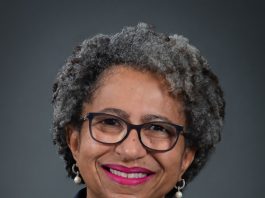Educators, Students Stage Statehouse Day Of Action In Opposition To Education Bills
- By Taylor Wooten TheStatehouseFile.com
The Indiana Coalition for Public Education hosted a Day of Action in the Statehouse atrium in response to the most recent hearing of House Bill 1134, during which only 30 of the 200 community members signed up to testify were able to be heard. Despite the bill being watered down by the Indiana Senate, educator advocacy groups and students came to share their concerns that the amended bill could still be harmful.
Sen. J.D. Ford, D-Indianapolis, has been outspoken about HB 1134 and House Bill 1041, a bill that would prevent transgender girls from being on K-12 girls’ sports teams. Ford said legislators should be focused on addressing the teacher shortage and learning losses during the pandemic.
“Instead we’re focusing on issues that, in my opinion, should not be on the docket,†Ford said.
Ford said thousands of his constituents have reached out to him asking him to vote against HB 1134. Indiana Coalition for Public Education encouraged attendees to write more letters to their representatives and to find them after the speaking concluded.
GlenEva Dunham, vice president of the Indiana chapter of the American Federation of Teachers, quoted Fannie Lou Hamer in honor of Black History Month, saying she is “sick and tired of being sick and tired.â€
“Year after year we find ourselves here, letting our legislators know that teachers not only have classroom voices,†Dunham said. “We have Statehouse voices as well.â€
Patricia Payne, who started the Racial Equity Office for Indianapolis Public Schools, has worked in education for 60 years. She called some of the education bills “unassumed and inequitable.â€
“I’ve never seen anything like it in my career,†Payne said.
Payne told her colleagues to keep fighting for public education and against legislation that could harm it.
“We will not, we cannot back down,†Payne said. “We owe it to those who came before us.â€
In response to parents testifying in support of HB 1134 with the argument that the bill would provide more transparency for parents, Rachel Burke of the Indiana Parent Teacher Association said the concerns the authors of the bill have do not align with how a real Indiana classroom operates.
The Indiana PTA is the largest parent group in the state, with tens of thousands of members, according to Burke. She said a loud minority of parents are leading the Indiana legislature down the wrong path.
“I’ve always believed that they have the absolute right to disagree with what is being taught and how it is being taught to their children,†she said. “They do not have the right to determine what my children have access to.â€
Jennifer McCormick, former state superintendent of public instruction, also spoke at the event. She said 90% of Indiana students attend public schools, and public schools value cooperation with parents and the community.
“Our parents, our communities, and our partners are collaborators,†McCormick said. “And for anyone to insinuate that we don’t understand, or we don’t operate that method, is just irresponsible.â€
Cathy Fuentes-Rohwer, president of the Indiana Coalition for Public Education, said the legislators were hypocrites because they cut off teacher testimony at the Senate Education and Career Development Committee meeting Wednesday while pushing a bill requiring public comment at school board meetings.
Three students spoke in the Statehouse atrium, one of them Tilly Robinson, a Bloomington senior who testified on the sister bill, Senate Bill 167 before it was struck down in January. Robinson said the bill was being used to score political points, citing the fact that similar bills exist in 37 states, according to Education Week. Even with the recent amendments, Robinson said the bill would harm education.
“The three concepts left in the battle are straw men in the culture war. You’d be hard-pressed to find an Indiana teacher that promotes any of those ideas,†Robinson said. “But that doesn’t change that HB 1134 is dangerous fundamentally.â€
Robinson said the bill still opens teachers up to political backlash.
Taniyah Williams, a junior at Lawrence Central High School in Indianapolis, said she was shocked when she learned about HB 1134 in her AP U.S. history class. Williams said being uncomfortable is a part of learning and the bill would take that opportunity away from students.
“We the students are resilient,†Williams said. “We can make our own decisions.â€
HB 1134 is scheduled to be amended and voted on in the Senate Education and Career Development Committee on Wednesday.
FOOTNOTE: Taylor Wooten is a reporter for TheStatehouseFile.com, a news website powered by Franklin College journalism students.






